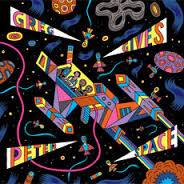Tradition insists that great art emerges from adversity. "Perhaps it’s good for one to suffer," wrote Aldous Huxley in 1923’s Antic Hay. "Can an artist do anything if he’s happy?" Well, Greg Gives Peter Space laughs in the face of such solemnity. Watching Greg Haines and Peter Broderick (alongside multi-instrumentalist, and sometime Efterklang collaborator, Martin Heyne) perform together recently, it was more than evident that they were indeed happy, especially when they stretched songs well beyond their recorded counterparts. Furthermore, thanks to their infectious enthusiasm, it was clear that making this music was as much a source of pleasure to the surprisingly large crowd as for the artists. In fact, it begged the question: what better reason to make music than for the sheer fun of it?
It’s clear that both Haines and Broderick revel in their craft: neither has ever seemed reluctant to share their music. Over the last eight years or so, Haines has accumulated four albums that find him drifting from Arvo Pärt influenced neo-classicism to dense electronic soundscapes. Broderick, meanwhile, has been almost absurdly prolific: he’s released ten solo albums – as well as countless collaborations – and these have traced an eccentric path, from the reflective instrumentals of 2007’s Float, which sometimes echoed the work of his labelmate Ólafur Arnalds, to idiosyncratic compositions such as the genuinely moving ‘Freyr!’ (from 2012’s These Walls Of Mine), which employed one of his father’s emails to address the loss of a childhood pet cat.
Broderick, however, has been steered by a recognisable aesthetic throughout, and this latest collaboration – born of the his and Haines’ shared obsession with dub – often feels like it’s a remix album of his unreleased material. Haines might not appreciate that focus on his partner’s art, but Broderick’s presence, and the shape and style of what’s on offer here, suggest it was Haines’ role to disrupt something that already existed rather than create music from scratch. No doubt the roles were shared, but for much of this release, he seems to take Broderick’s charming but unusual songs, lay down sparse but heavy bass foundations, and add percussion that twitches around multi-tracked vocals at times swathed in subtle effects.
The results are indeed fun, if occasionally a little meandering. They’re lifted throughout, however, by the joie de vivre that comes with studio improvisation. Within the live arena, it’s true that the sense they could head anywhere brought these tracks further to life, but they still delight regularly on record, especially on ‘The Feeling Shaker’, where Broderick is moved to repeatedly (and perhaps inevitably) declare, "I can’t shake this feeling". ‘A Clear View’, meanwhile – and its cousin, ‘A Clear Dub’ – underlines its influences with gently chugging guitars, while opener, ‘The Drive’, keeps things sparse before swelling towards a short-lived but swooping climax. If Greg Gives Peter Space has a precedent, it’s arguably less Lee Perry and more Schneider TM’s late ’90s journeys into indie-electronica: familiar structures re-contextualised and transformed by unfamiliar settings.
The best songs are surprisingly – or perhaps not – the two that use dub as a mere inspiration rather than foundation. On ‘Electric Eel River’, Broderick picks out a forlorn figure on what sounds like a banjo, his voice gently reaching towards its upper registers, and otherwise just an occasional slide of deep bass, an almost negligible shimmer of electronic effects, and a glorious sense of space. ‘February Space Duet’, meanwhile, is an ambient affair that makes for an unexpected closer, Broderick’s disembodied vocals floating between columns of Harold Budd atmospherics as if freed from gravity. They suggest that, had Haines and Broderick allowed themselves to move beyond the realms of pastiche – which nonetheless serve them well – they might have ended up in even more intriguing territory.
All the same, Greg Gives Peter Space is a genuinely rewarding release, and credit to Erased Tapes for releasing what some labels might have considered an indulgence, and a commercially unattractive one at that. Its six tracks may be, in some sense, throwaway, but these late night noodlings by two great friends are infused with simple joys. Suffering may indeed breed profound insight and expression, but pleasure too has its place: everyone needs to smile sometimes.
<div class="fb-comments" data-href="http://thequietus.com/articles/15682-greg-gives-peter-space-greg-gives-peter-space-review” data-width="550">


